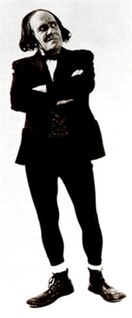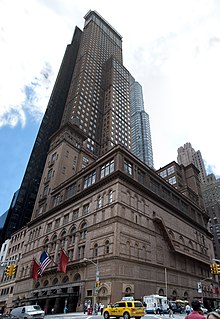
Carnegie Hall is a concert venue in Midtown Manhattan in New York City, United States, located at 881 Seventh Avenue, occupying the east side of Seventh Avenue between West 56th Street and West 57th Street, two blocks south of Central Park.

Scotland is internationally known for its traditional music, which remained vibrant throughout the 20th century and into the 21st, when many traditional forms worldwide lost popularity to pop music. In spite of emigration and a well-developed connection to music imported from the rest of Europe and the United States, the music of Scotland has kept many of its traditional aspects; indeed, it has itself influenced many forms of music.

Scottish folk music is music that uses forms that are identified as part of the Scottish musical tradition. There is evidence that there was a flourishing culture of popular music in Scotland during the late Middle Ages, but the only song with a melody to survive from this period is the "Pleugh Song". After the Reformation, the secular popular tradition of music continued, despite attempts by the Kirk, particularly in the Lowlands, to suppress dancing and events like penny weddings. The first clear reference to the use of the Highland bagpipes mentions their use at the Battle of Pinkie Cleugh in 1547. The Highlands in the early seventeenth century saw the development of piping families including the MacCrimmons, MacArthurs, MacGregors and the Mackays of Gairloch. There is also evidence of adoption of the fiddle in the Highlands. Well-known musicians included the fiddler Pattie Birnie and the piper Habbie Simpson. This tradition continued into the nineteenth century, with major figures such as the fiddlers Neil and his son Nathaniel Gow. There is evidence of ballads from this period. Some may date back to the late Medieval era and deal with events and people that can be traced back as far as the thirteenth century. They remained an oral tradition until they were collected as folk songs in the eighteenth century.

Glasgow Royal Concert Hall is a major concert and arts venue, in the city of Glasgow, Scotland. It is owned by Glasgow City Council and operated by Glasgow Life, an agency of Glasgow City Council, which also runs Glasgow’s City Halls and Old Fruitmarket venue.

The Royal Conservatoire of Scotland, formerly the Royal Scottish Academy of Music and Drama, is a conservatoire of dance, drama, music, production and film in the centre of Glasgow, Scotland. It is one of the oldest and most prestigious performing arts schools in the United Kingdom, and ranked third in the world as of 2017. Founded in 1847, it has become the busiest performing arts venue in Scotland with over 500 public performances each year.

The Edinburgh International Festival is an annual festival of performing arts in Edinburgh, Scotland, over three weeks in August. By invitation from the Festival Director, the International Festival brings top class performers of music, theatre, opera and dance from around the world to perform. The festival also hosts a series of visual art exhibitions, talks and workshops.

Cowcaddens is an area of the city of Glasgow, Scotland. It is very close to the city centre and is bordered by the newer area of Garnethill to the south-west and old Townhead to the east.

The Royal Scottish National Orchestra (RSNO) is an international Scottish orchestra, based in Glasgow at its own music centre and rehearsal studios directly connected to the Glasgow Royal Concert Hall at the top of Buchanan Street. The RSNO receives support from the Scottish Government. The RSNO performs throughout Scotland, at such venues as Glasgow Royal Concert Hall, Usher Hall (Edinburgh), Caird Hall (Dundee), Aberdeen Music Hall, Perth Concert Hall or Eden Court Inverness. Thomas Søndergård is the orchestra's current music director, since 2018.

The Usher Hall is a concert hall, situated on Lothian Road, in the west end of Edinburgh, Scotland. It has hosted concerts and events since its construction in 1914 and can hold approximately 2,200 people in its recently restored auditorium, which is well loved by performers due to its acoustics. The Hall is flanked by The Royal Lyceum Theatre on the right and The Traverse Theatre on the left. Historic Scotland has registered the Hall with Category A listed building status.
The city of Glasgow, Scotland, has many amenities for a wide range of cultural activities, from curling to opera and from football to art appreciation; it also has a large selection of museums that include those devoted to transport, religion, and modern art. In 2009 Glasgow was awarded the title UNESCO Creative City of Music in recognition of its vibrant live music scene and its distinguished heritage. Glasgow has three major universities, each involved in creative and literary arts, and the city has the largest public reference library in Europe in the form of the Mitchell Library. Scotland's largest newspapers and national television and radio companies are based in the city.
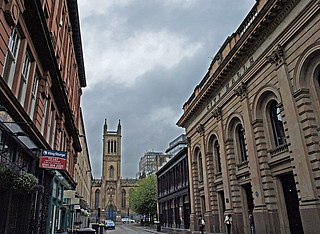
Glasgow's City Halls and Old Fruitmarket is a concert hall and former market located on Candleriggs, in the Merchant City, Glasgow, Scotland.
The Celtic Connections festival started in 1994 in Glasgow, Scotland, and has since been held every January. Featuring over 300 concerts, ceilidhs, talks, free events, late night sessions and workshops, the festival focuses on the roots of traditional Scottish music and also features international folk, roots and world music artists. The festival is produced and promoted by Glasgow’s Concert Halls. Donald Shaw, a founding member of Capercaillie, was appointed Celtic Connections Artistic Director in 2006. Shaw announced in February 2018 that he would be stepping aside from the role.

The Theatre Royal is owned by Scottish Opera and is the oldest theatre in Glasgow and the longest running in Scotland. Located at 282 Hope Street, its front door was originally round the corner in Cowcaddens Street. It currently accommodates 1,541 people. The theatre opened in 1867, adopting the name Theatre Royal two years later. It is also the birthplace of Howard & Wyndham Ltd, owners and managers of theatres in Scotland and England until the 1970s, created by its chairman Baillie Michael Simons in 1895. It was Simons who as a cultural entrepreneur of his day also promoted the building of Kelvingrove Art Gallery and Museum and Glasgow's International Exhibitions of 1888 and 1901.
The Music Hall is a concert hall in Aberdeen, Scotland, formerly the city's Assembly Rooms, located on Union Street in the city centre.

St Mary's Music School is a music school in Scotland in Edinburgh, for boys and girls aged 9 to 19 and is also the Choir School of St Mary's Episcopal Cathedral. The school, which is non-denominational, provides education for children with a special talent in music, and is Scotland's only full-time independent specialist music school. In 2017 the school has 80 pupils from many different backgrounds and from all parts of Scotland, the rest of the UK and abroad - 49 day pupils and 31 boarders, plus one student on the school's Part-time Pathways to Specialism scheme.
"Peerie" Willie Johnson was a Scottish folk guitarist and bassist. He was respected as an influential and innovative musician in the Shetland folk scene. Since 2005 there has been a "Peerie" Willie Guitar Festival" each year on the islands.
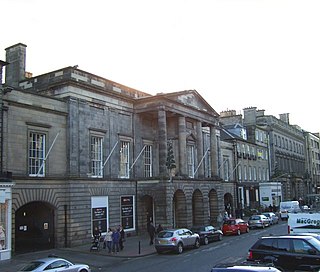
The Assembly Rooms are meeting halls in central Edinburgh, Scotland. Originally solely a meeting place for social gatherings, it is now also used as an arts venue and for public events, including the Edinburgh Festival Fringe and the Hogmanay celebrations. There are four rooms, with moveable chairs or tables, that are used year-round and are available for private functions: Music Hall, Ballroom, Supper Room and Edinburgh Suite.
The principal is the chief executive and the chief academic officer of a university or college in certain parts of the Commonwealth.
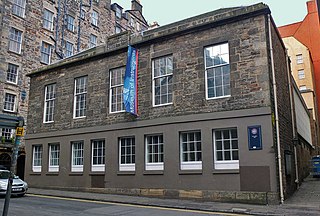
St Cecilia's Hall is a small concert hall in the city of Edinburgh, Scotland, in the United Kingdom. It is on the corner of Niddry Street and the Cowgate, about 168 metres (551 ft) south of the Royal Mile. The hall dates from 1763 and was the first purpose-built concert hall in Scotland. It is a Category A listed building.

The Reid Concert Hall is a small music venue in the city of Edinburgh, Scotland, in the United Kingdom. It is located in the south-western corner of Bristo Square about 0.53 kilometres (0.33 mi) south of the Royal Mile, and is part of the University of Edinburgh. Originally opened in 1859 as the Reid School of Music by the university's professor of music, John Donaldson (1789-1865), it was designed by the Scottish Architect David Cousin and is a Category A listed building. The hall is named after General John Reid, an army officer and musician who founded the Chair of Music at the university.


